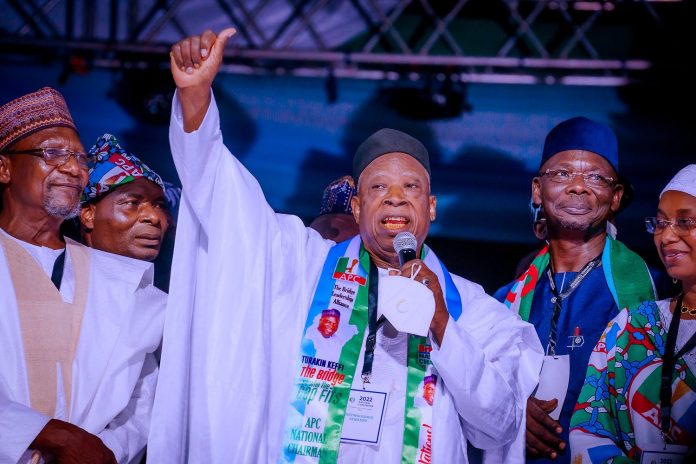The redoubtable Adams Oshiomhole, two-time governor of Edo State, was elected national chairman of APC in 2018.
In my column welcoming him to the hot seat, I advised him, gratis, to commit himself and the members of the national working committee to internal democracy because “it is critical to the health of our democracy. Internal democracy in the political parties is all about justice, fairness and a level-playing field…”
I cannot claim that he took my free advice seriously. But he did well enough to lead his party to victory in the 2019 general elections. Before that election season inked itself in our national history, however, the worms were already inching their way into the apple.
Some of the leading members of the party such as the then Senate President, Dr Bukola Saraki, had parted ways with it and returned to PDP. They were about to do to APC what they did to PDP in 2014/2015. Luckily for the party, the bleeding did not lead to a critical loss of blood in 2019. After only one term in Aso Rock, fatigue had not quite set in for APC.
But given the nature and the circumstances of its birth, APC had the immediate challenge of hammering the different groups that made its birth possible into a unified whole. There was a remiss. It would appear that the challenge was not quite taken up, hence it began to haemorrhage so early in its life.
After the 2019 general elections, Oshiomhole began to have problems with the APC governors. As a combative man, forged from the anvils of trade unionism, he fought back. But by 2020, it was clear that the centre was no longer holding for the party and its leader. Some of the governors, none of whom is a poster child for best practices in democracy, complained that Oshiomhole had become dictatorial and no longer felt bound to play by the rules and the constitution of the party. They wanted him out.
The National Executive Committee stepped in at the instance of President Buhari to patch up things and save the party. Oshiomhole yielded his place to the Governor of Yobe State, Mallam Mai Mala Buni, as an interim leader of the party.
He headed what was called the “Caretaker/Extraordinary Convention Planning Committee.” His brief was to unite the party at all levels. He had a six-month mandate to make water flow up the hill. He was soon to see that there was no quick fix to the malaise afflicting the party. Crises had gripped it at all levels – national, state and local government. NEC knew who could fix the problem. Enter Senator Abdullahi Adamu, Turakin Keffi and a ranking senator.
The party constituted a 9-member national reconciliation committee with Adamu as chairman on September 14 and was inaugurated by Buni on October 11 last year. It was tasked with three terms of reference, the most important being: “Conduct appropriate engagement between identified groups in each state where there are disputes with a view to bringing about genuine reconciliation and establishing lasting peace and unity in the party.”
Its primary brief was to recommend how the leaders of the party could turn it back from the sunset to the sunrise. Adamu is a savvy politician with the unusual gift of quickly seeing and appreciating political problems wherever they exist. He has a demonstrated knack too for throwing himself into assignments heart and soul because it is always important for him to leave his size 11 shoe size footprints along whatever path he passes through in his political career.
Adamu, I would hazard an informed guess, had no illusions about the task before him. He knew his task went beyond the assignment as conceived by NEC. He knew that the fate of the party hung in the balance but was now in his hands.
He appreciated the fact that he had been beckoned to help save the party and reposition it for the tough task of winning the 2023 general elections. I do not think he needed anyone to tell him that what he made of his assignment would largely determine the present and the future of the ruling party. Failure was not an option. If he failed to cement the cracks in the party, they would surely widen and threaten the party edifice. He and his team set to work.
They found that matters were much worse than the national headquarters of the party knew. The party was torn. Every state branch of the party was convulsed in avoidable crises. Current and former state governors of the party were engaged in a titanic battle for supremacy. They were pulling the party in different directions, exposing its flanks and making it vulnerable to whatever political party was attracted to fishing in its backyard.
They toured the 36 states and received an avalanche of petitions against the leaders of the party at the state level. Some of the leaders and the members of the party were stoking the fires of belligerence as if destroying the party to get their own pound of flesh, was a holy task.
The tour helped them to appreciate how deeply divided the party was and the obvious threat it faced in its continued tenancy in Aso Rock Villa. Adamu and his team distilled the crises rocking the party into a lack of unity and cohesion caused mainly but not entirely by the avoidable struggle for supremacy between current and former governors as well as between the party leadership and other powerful stakeholders. The path of unity and cohesion, the two main pillars of a political party, had been blocked or abandoned. The party needed to return to that path.
The committee was still at work when NEC announced the date for the national convention of the party. It had to wind up its assignment. Its report detailed the crises in each state branch of the party, indicating that the fire on the mountain was an existential threat to the party.
The committee submitted its report and recommendations to Buni on January 31 this year. It made valid suggestions on the resolution of the crises in each state and expressed the hope that its work would be “useful to the party in ensuring that the APC conducts a successful convention as well as expand its electoral fortunes to more states in the years that lay ahead.”
The report was not destined to spend its life on the cold shelves of inattention, as such reports usually do in our country. The party knew that its problems had reached a crisis situation. It had to act on the report. The contest for the chairmanship of the party was also heating up the party itself. Adamu was in the running for the job too.
A couple of months after the Adamu committee submitted its report, a little bird whispered into his ears and informed him that President Buhari was prepared to support his bid for the national chairmanship of the party. Buhari must have been impressed by the work of the committee.
On March 26, Adamu was elected the national chairman of the party and thus became the kingmaker in the 2023 general elections. He took up his new assignment critical to the party less than two months before the party convention and primaries. He had no luxury of time; he had only the challenges of his new national political assignment.
So far, he is walking the difficult but right path to save the party with its rather patchy record of performance at both the centre and the constituent units of the federation.
On June 8, the party under Adamu achieved a major political feat: it elected Asiwaju Bola Ahmed Tinubu, as its presidential candidate for the 2023 presidential election. If its fortunes hold, we will witness a power shift to the south next year. It would be no small achievement for Adamu.



